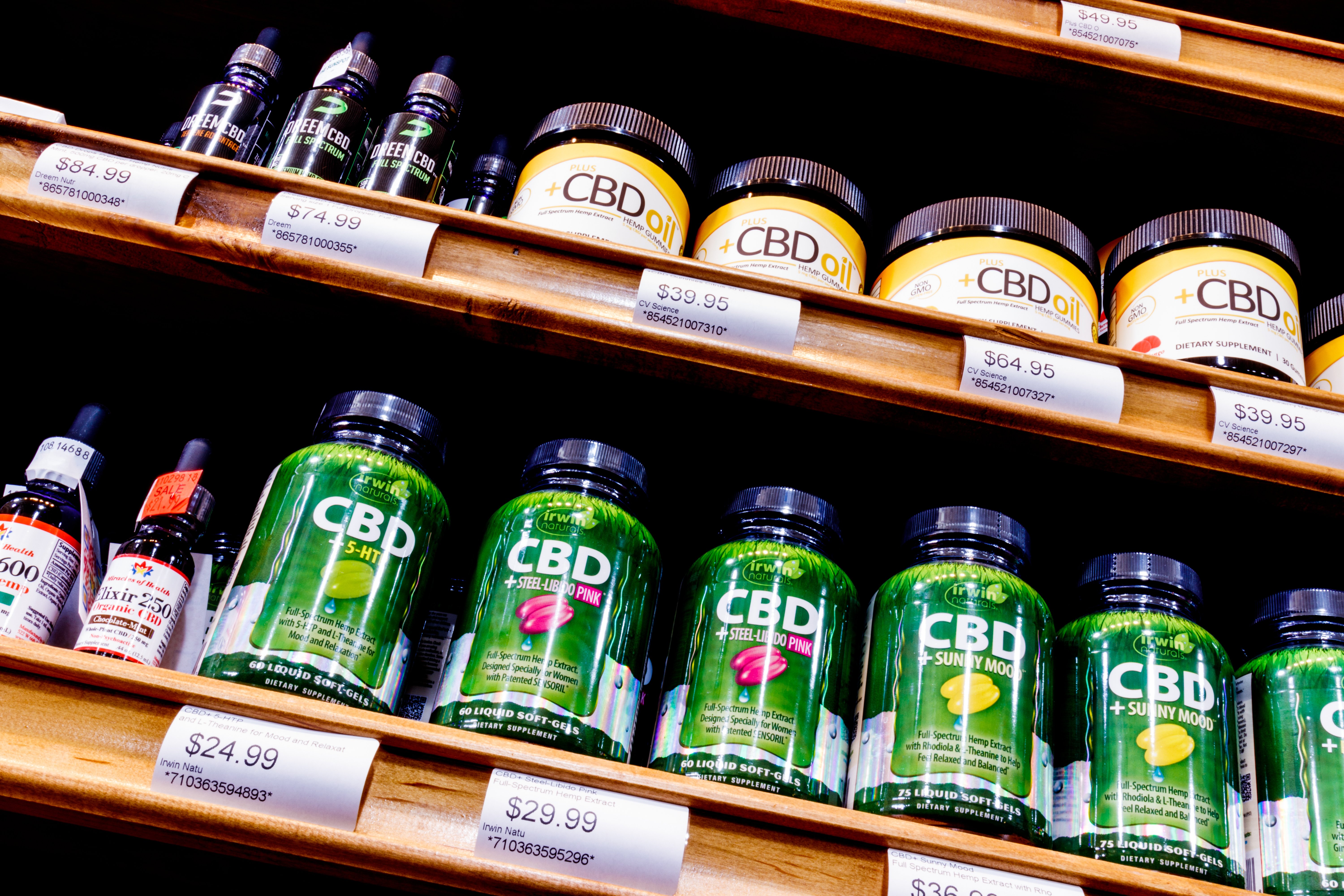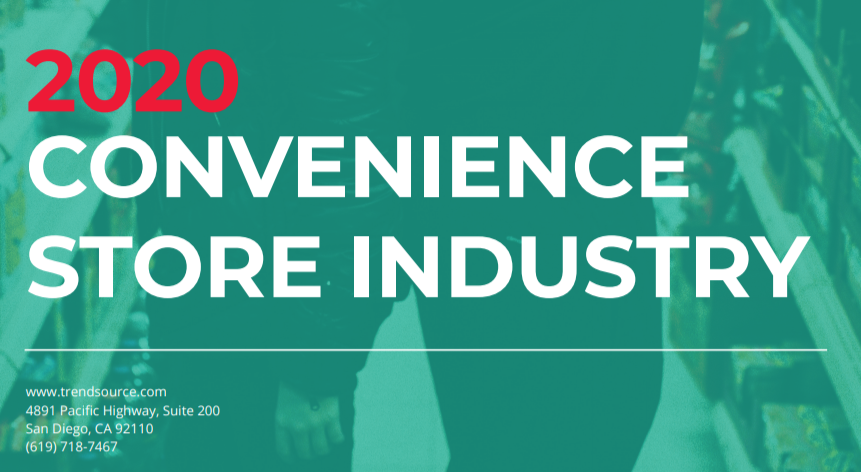E-Alternative Solutions (EAS), a vaping and tobacco manufacturer, has developed a line of cannabidiol (CBD) tinctures specifically for C-store impulse aisles. Branded Forth Cannabidiol (CBD), the products come in single-serving 300 and 600 milligram sizes and are full spectrum CBD (more on that later) with hemp, strawberry lemon, cool mint, citrus berry, and peppermint flavors.
CBD, of course, is the compound found in cannabis thought to have untold health benefits, helping with inflammation, anxiety, arthritis, cancer, indigestion...and a host of other conditions. With consumers increasingly interested in functional foods and health and wellness goods, and the general fascination around cannabis, these products are already enjoying eye-popping sales, which will only increase over time.
According to EAS’s press release, the products are “market-tested and compliant for the convenience-store retail channel.” And as VP of Sales Jeff Brown added, “EAS brings the tools to help retailers effectively merchandise and sell their goods and unmatched compliance expertise...We work to drive shoppers through retailers' doors and help wholesalers and retailers better manage new business categories."
There’s a lot of buzzwords, hype, and promise in that statement, and we are going to put in the cannabis and convenience store market research to help unpack all that meaning and significance. Why is CBD such a hot topic among convenience store operators, how big can we really expect this market to grow, and to what extent will it turn off consumers uninterested in any cannabis products?
Patchwork Legalization, Mass Confusion, and the 2018 Farm Bill
Before we proceed, we need to have a brief word about the the patchwork of legalization currently operating in the United States: In the 2018 Farm Bill, congress distinguished between products derived from hemp and from cannabis, meaning that, federally, any product that comes from hemp is legal to produce and sell. This acts as a legalization baseline in states yet to legalize cannabis writ large.
Confusingly, both hemp and cannabis are the same plant, though cannabis is engineered to boost its psychoactive properties, flavor, and growth rate. In order to distinguish between the two, the feds set the bar at .03% THC--any product under that threshold is considered hemp, anything above is cannabis and not federally legal. (For those unfamiliar with the lingo, THC is the psychoactive substance found in cannabis, you know, the stuff that gets you high).
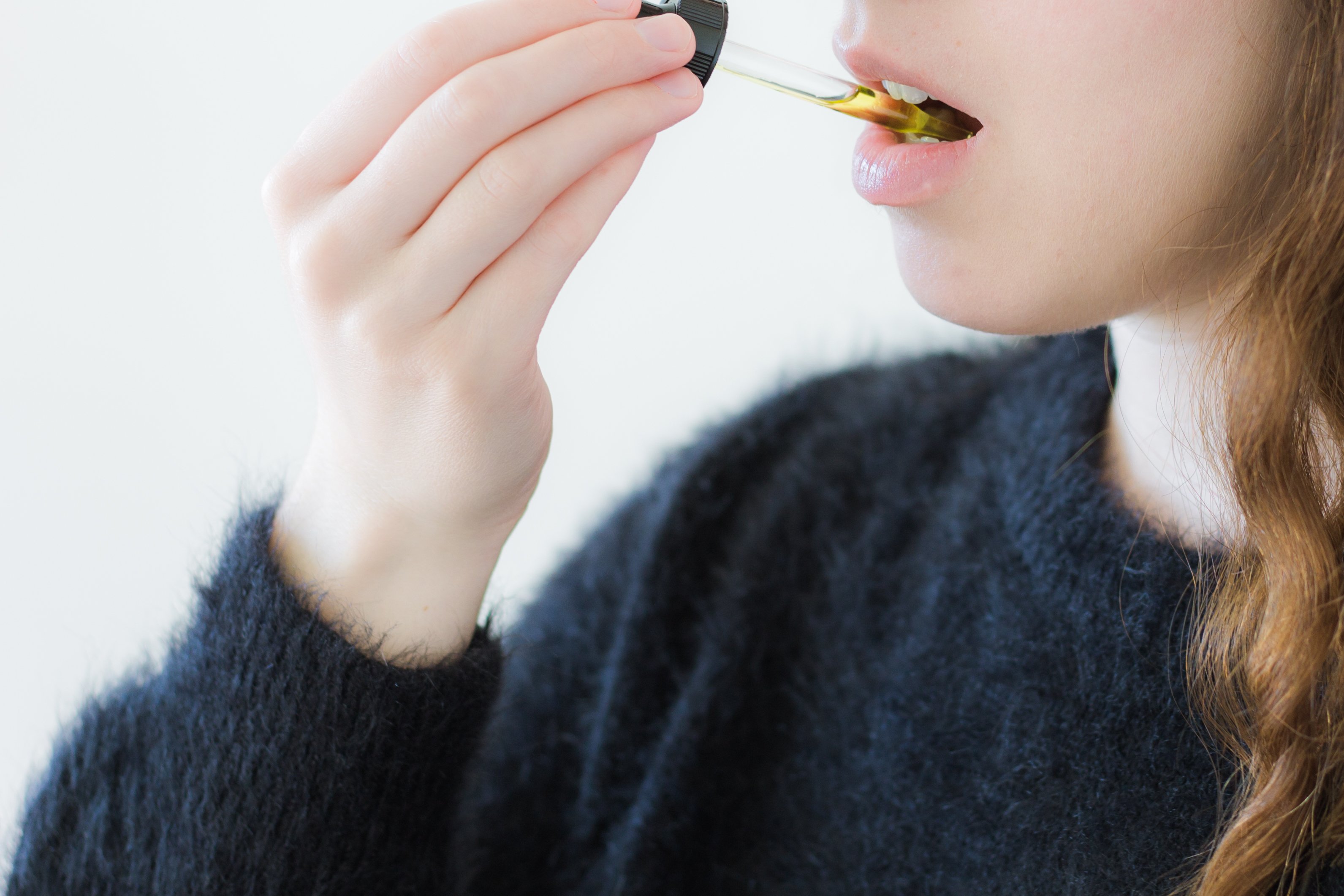
Of course, many states have legalized medical and recreational cannabis, and in these states, restrictions govern what types of products are available and where, but manufacturers and retailers have more leeway. For those selling CBD products in non-legalized states, it must be below .03% THC.
The Three Types of CBD
OK with legal status out of the way, now it's time to understand the three different ways CBD products are derived and delivered. There are three categories of CBD products: full spectrum CBD, CBD isolate, and broad spectrum CBD (don’t worry if this is all new to you--even the most seasoned stoner is likely not familiar with the CBD spectrum). Keep in mind, these terms have developed somewhat organically and remain fluid as the market and its regulators sort this all out.
Full spectrum CBD is at the premium end and is derived by extracting a full spectrum of cannabis components, including THC. These products are more heavily regulated in states yet to legalize cannabis, where, again, they can be sold as hemp so long as the THC content is below .03%. Yet CBD proponents argue that full spectrum products have greater health benefits, likely owing to the entourage effect whereby different components contribute to CBD absorption and efficacy.
Of course, the mere presence of THC in any product can be a turnoff for a consumer who wants the arthritis benefits without getting high like Maureen Dowd. So, while it may be a bit frightening for neophytes, it is the preferred product of the acolytes.
On the other side, there is CBD isolate, which manufacturers produce by processing plants to isolate and extract CBD. This means that no other plant components, especially THC, are incorporated into the product.
This is good news for manufacturers and retailers concerned about regulation as well as consumers who remain intimidated by or uninterested in THC in any concentration. But for purists, the product reeks of industrial artificiality, and there are doubts that it is anywhere near as effective as a full spectrum product. Think of it as the difference between eating an orange and taking a vitamin c pill. While both may contain an abundance of vitamin C, there are questions about how readily and effectively your body absorbs the nutrients in pill form, with doctors and nutritionists agreeing the body is more receptive to the vitamin c in an orange fruit than an orange capsule.
And then there is broad spectrum CBD, which incorporates cannabis’s non-psychoactive components, promoting the entourage effect, but isolates and eliminates the THC in the plant. This product splits the difference between full spectrum and CBD isolate. In states where CBD is legal only owing to the 2018 Farm Bill, this is the next best thing to full spectrum CBD, but is regarded by CBD devotees as unnecessarily adulterated and processed.
This all may seem esoteric at the moment, but rest assured: these will become common descriptors for an increasingly popular product--remember how ten years ago nobody knew the difference between indica and sativa? Yeah, it's like that.
The Convenience of CBD Sales
With different products for different shades of legality CBD seems poised to explode, particularly in the c-store sector. As reported by the Motley Fool, domestic CBD sales will jump from $591 million in 2018 to $22 billion by 2022. Yeah, that’s a 147% compound annual growth rate, and that is insane. It dwarfs the broader cannabis market projections, which are already ahead of overall market expectations.
One reason for this projected growth is CBD’s advance into the aisles of convenience stores across the country. We’re already seeing this in California, as this photo from your humble blogger’s local 7-Eleven can attest:
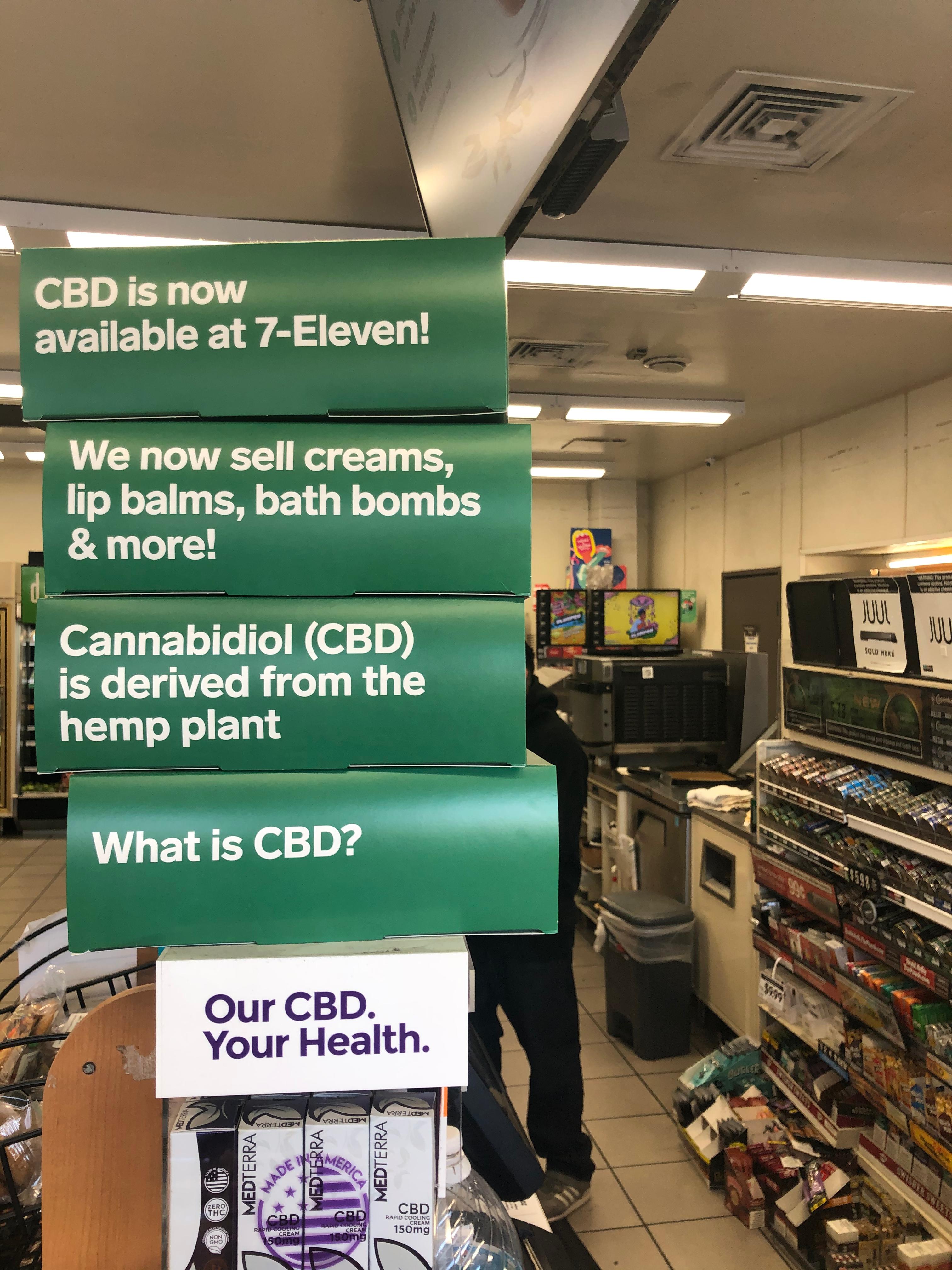
And this is just the beginning.
Last summer, Harvest Health & Recreation partnered with the Asian American Trade Associations Council (AATAC) to bring three of its CBD products to more than 10,000 independently operated convenience stores and gas stations. They hope to have it in 30,000 locations by the end of 2020 and, knowing that the AATAC includes 50,000 independent c-store operators with 90,000 locations (60% of US c-stores), these numbers only stand to increase.
To be clear, we’re not just talking about ma and pa stores or one-off bodegas here--these independent owners operate c-stores adjoining Chevron, Shell, Union Oil, and Sunoco stations. Coupled with the aforementioned EAS announcement, it is easy to see how--according to an admittedly self-serving projection from cannabis consulting group Brightfield Group--c-store CBD sales can climb as high as $10 billion a year by 2020.
A lot of this, of course, has to do with legality and availability--people are likelier to buy products that are readily available and without legal consequence. But it also has to do with education and acclimation.
As one research director told Convenience Store News, ““The more familiar consumers become, the more mainstream [CBD] will be. When we speak to people who don’t live in states where it’s legal, they think the products will make them high, but once enough people know that isn’t the case, the market will really open up.”
C-store operators, we can be sure, will do their part to ensure its future success because, well, this isn’t your typical impulse item. With margins higher than any c-store product this side of alcohol, c-stores will likely invest time and money into training initiatives for store employees who will need help answering questions and offering upsells. They will similarly devote a good amount of shelf-space and marketing might to these products, which can drive customer traffic and are a salve for gas stations operating on razor thin margins.
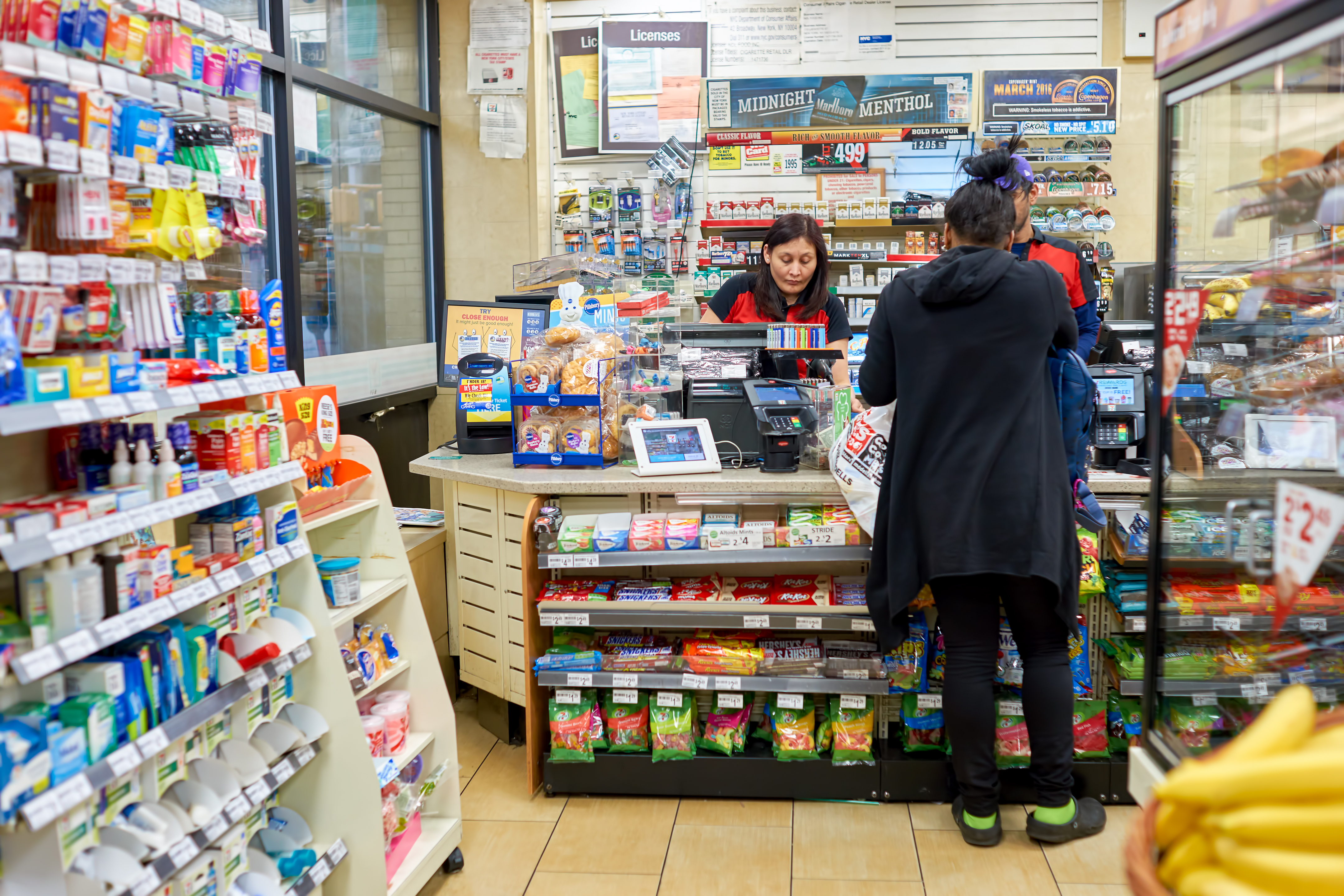
But have we moved far enough past the Reefer Madness era? Will consumers, particularly those uninterested in cannabis products, be turned off by in-store CBD sales? Will they resist products and avoid stores that sell them simply because the thought of cannabis reminds them of hippies, rappers, and skaters (admittedly some of your humble blogger's favorite groups of people)?
Well, fortunately, TrendSource has some answers.
C-Store Market Research and the 2019 Convenience Store Industry Report
TrendSource’s 2019 Convenience Store Industry Report found that CBD sales are nowhere near as unpopular, even among non-users, as one might suspect. Though there is some opposition to the sale of these products within c-stores, it mainly comes from the silent generation, while everybody from boomers to the 18-year-old babies are at least somewhat comfortable with these new products.
Consider that 80% of our respondents do not use cannabis products and that 60.9% were not at all interested in purchasing these products from their local convenience stores. Yet nonetheless, nearly two-thirds of respondents were not uncomfortable with c-stores selling cannabis, regardless of whether they personally were interested in purchasing it. Indeed, only 36.9% of our overall respondent base said they were somewhat or extremely uncomfortable with such product sales, the remaining 63.1% of respondents were not made uncomfortable by the presence of cannabis products within convenience stores.
Granted, your humble blogger lives in Long Beach, a relatively urban and liberal area birthplace of known weed enthusiasts like Sublime and Snoop Dogg, but nobody looked all too uncomfortable in the shadows of the giant CBD display at that local 7-Eleven.
